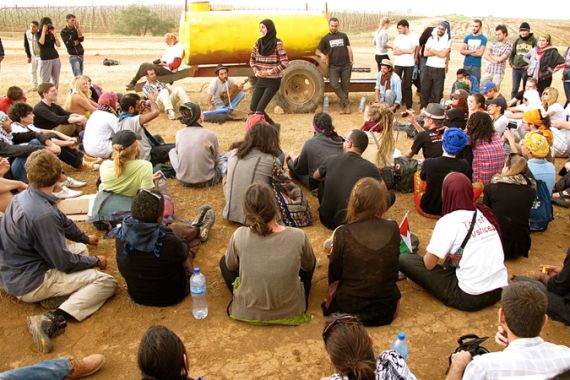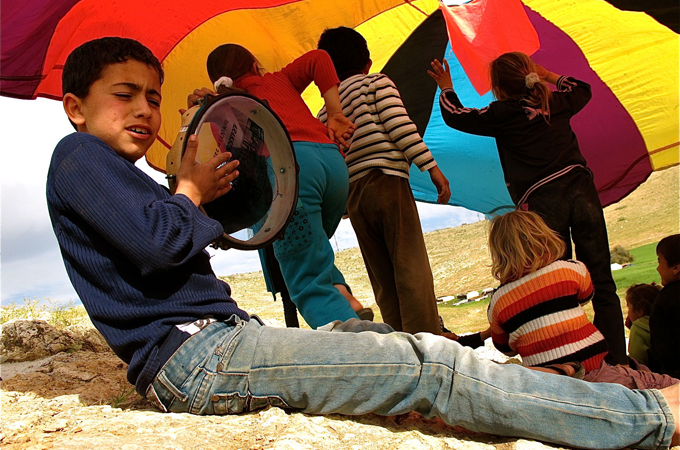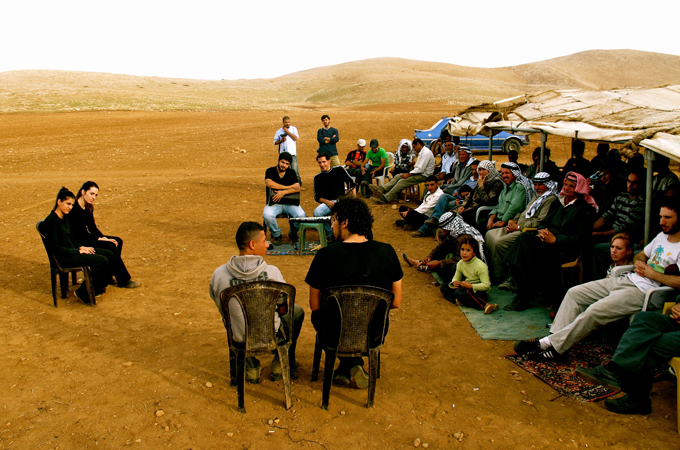Palestinians performing therapy through art
Dance, music and improvisational theatre are being used throughout the Occupied Territories to help ease hardships.

Ramallah, West Bank – On a chilly Tuesday evening, a group of Palestinians and foreigners gathered to watch France’s Maguy Marin dance company gracefully contort itself on stage in the Cultural Palace of Ramallah.
It was the beginning of the annual Ramallah Contemporary Dance Festival (RCDF), which has brought some 110 international dance companies and more than 1,200 artists to Ramallah over the past seven years. More than just a dance festival, the RCDF offers workshops, film screenings, panel discussions and city-wide performances.
Keep reading
list of 4 itemsInside the pressures facing Quebec’s billion-dollar maple syrup industry
‘Accepted in both [worlds]’: Indonesia’s Chinese Muslims prepare for Eid
Photos: Mexico, US, Canada mesmerised by rare total solar eclipse
The RCDF is the first large-scale artistic festival to take place since November, when the Palestinian Authority gained non-member observer status at the UN General Assembly.
Since then, the occupied Palestinian territories have experienced dramatic upheavals: Israel launched an assault on the Gaza Strip later that month, the West Bank has been further threatened by expansion of Israeli settlements – particularly in the strategically significant E1 Area – and a new wave of grassroots protest was sparked in response.
|
“In general, in working with theatre, there are a lot of exercises that promote understanding of one’s strengths and weaknesses.“ – Sami Metsawi, actor, writer, musician |
“The war on Gaza and the increase in settlements, these things reawakened our sense of urgency,” Sami Metsawi, a seasoned Palestinian actor, writer and musician, told Al Jazeera. “When you see injustice, especially when it’s related to you, you explode.”
Theatre as therapy
The occupation’s effects are extensive, from forceful suppression of unarmed protests to restrictions imposed on freedom of movement by Israeli checkpoints. The consequences are widely felt throughout the presumptive Palestinian state.
The Freedom Bus, an artistic initiative started by the Freedom Theatre of Jenin, is travelling village to village in the West Bank, employing “Playback Theatre,” a method of dramatising real-life events as a means of outreach and advocacy.
The group operates according to the guidelines of the technique: it listens to the audience recount tales of life under the strain of a constant military presence, and then improvises a theatrical scene based on what are commonly shared experiences. These performances are meant to reinvigorate demoralised village populations.
“Stories of sacrifice and resistance help to awaken and incite an audience that might be trapped in forgetfulness, hopelessness or apathy,” Ben Rivers, the lead organiser of the Freedom Bus, told Al Jazeera.
“The sharing of personal stories holds therapeutic benefit. By releasing the burden of accumulated trauma, people explain that they feel ready to continue their struggle with greater energy.”
Theatrical demonstrations not only help the audience, but the actors themselves.
The part of Palestinian life that most suffers from the occupation is the economy, tightly shackled to obligations that stem from a number of agreements with Israel.
 |
| Children participating in the shows [Ben Rivers/Freedom Theatre] |
“In general, in working with theatre, there are a lot of exercises that promote understanding of one’s strengths and weaknesses,” Metsawi said. “You get to relax, you get to live in the moment, enjoy your spontaneity. In this you get rid of a lot of traumas, or, at least, you understand them.”
Art in a time of austerity
The Palestinian economy, largely dependent on funds from donor nations, has lately been in a downward spiral. A recent report published by the International Monetary Fund shows general unemployment rates rose to 23 percent in the West Bank and 32 percent in Gaza.
In spite of the economic difficulties, cultural centres of the West Bank are pressing on.
“This year, the funds for the festival were very low,” Khaled Elayyan, executive director of the First Ramallah Group, the organisation planning the RCDF, told Al Jazeera. “In spite of this, we are making it work. We have a hard economic situation, but because the situation is hard, it doesn’t mean stop producing art. It means we must continue.”
Elayyan stressed the importance of dance and theatre to the demographic hardest hit by economic woes: the youth. Youth unemployment sits at 28 percent in the West Bank and a startling 49 percent in Gaza.
“We help the community through education; we give the youth the facilities to work, to be dancers,” he said. “This way they can express themselves.”
Through this expression, dance and theatre are giving an increasingly idle and frustrated demographic of Palestinian society an artistic outlet and offers them fellowship. Dance and theatre are forms of art that almost always require group participation.
Theatre fostering community
This fellowship has found a home in the form of the local theatre, which provides a rendezvous for all ages. The Al-Kasaba Theatre and Cinematheque, for example, is the only location in Ramallah where a film can be enjoyed on a cinema-sized screen.
 |
| Freedom Bus actors at a village [Ben Rivers/Freedom Theatre] |
Varying age groups are taken into consideration as well: Al-Kasaba features productions for both youth and adults. “The theatre provides a place where the people can share, discuss and hopefully see things differently,” George Ibrahim, the general director of Al-Kasaba, told Al Jazeera.
For adults, politically charged documentaries such as Five Broken Cameras are screened, and the work of playwrights such as Federico Garcia Lorca and Albert Camus are performed.
For children, works such as Hans Christian Anderson’s “The Emperor’s New Clothes” are common. Al-Kasaba also puts on dance shows: six of the RCDF performances are taking place on its stage.
Adapted foreign works, such as “The Blood Wedding and Caligula”, serve another purpose. “To adapt an international play to a Palestinian standpoint shows that the problems of man are the same all over the world, it gives the people a sense of belonging in the world community,” Ibrahim said.
The tone of his original work is decidedly Palestinian. Subjects include the Israeli separation barrier, the pain a Palestinian emigrant endures as he leaves his home, and the psychological and social difficulties a Palestinian confronts after being released from Israeli prisons.
According to Ibrahim, these plays are “our history on the stage”.
A long history
While the recent increase in media attention might lead some to think that creativity is new to Palestinian society and its civic struggle, many argue that nothing could be farther from the truth.
|
“Sustaining imagination and creativity under conditions of extreme violence and oppression is an extraordinary feat – a true triumph of the human spirit.“ – Ben Rivers, Freedom Bus |
“Poets, playwrights, musicians and other artists have always played an important role in Palestinian popular struggle,” Rivers said. “No attention is given to the fact that various forms of unarmed struggle have existed in Palestine for over 130 years.”
An extensive cultural footprint left by Palestinian artists is visible at all times. Walking through the streets of Bethlehem or Ramallah, one frequently sees graffiti that draws inspiration from the passages and stanzas of Palestinian poets and authors.
“It’s our identity,” Elayyan said. “Through art, we can tell our story better than through political speeches.”
Palestinian creativity, particularly in the West Bank, operates “as an antidote” to domination, Rivers said.
“Sustaining imagination and creativity under conditions of extreme violence and oppression is an extraordinary feat,” Rivers continued. “A true triumph of the human spirit.”
Follow Creede Newton on Twitter: @CreedeNewton